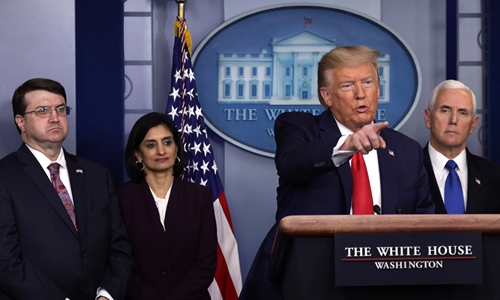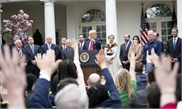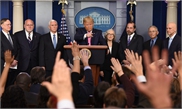Trump sacrifices China-US ties to cover up his mishandling of coronavirus outbreak

US President Donald Trump speaks as Secretary of Veterans Affairs Robert Wilkie, Administrator of the Centers for Medicare and Medicaid Services Seema Verma on Wednesday. Photo: AFP
US President Donald Trump on Tuesday defended his use of the term "Chinese virus," claiming it is "very accurate." In an attempt to counter widespread criticism that the term "creates a stigma," Trump accused China of "saying that our military gave it to them" and said rather than "having an argument," he will call the virus "where it came from."Trump's claim might refer to tweets posted last week by Chinese Foreign Ministry spokesperson Zhao Lijian. Zhao's remark was made on his personal account, and it was a question not a conclusion. Moreover, long before Zhao's posts, some high-level US officials including Secretary of State Mike Pompeo, and many mainstream US media had more than once called the coronavirus the "China virus" or "New virus." Trump's defense for using of the abusive term makes no sense.
The World Health Organization (WHO) has named the virus "SARS-CoV-2" and the disease "COVID-19" to avoid "creating unnecessary fear for some populations." But Trump insists on referring to it as the "Chinese virus," revealing his malicious intentions. That he would chose the word "Chinese" rather than "China" or "Wuhan" is even more vile, as it implies the virus was somehow intentionally brought to the US by Chinese people.
The president's assertion is very likely to stir conflict and hatred between ethnic groups in the US, resulting in discrimination against Chinese and Asians and leading to needless public panic. It may also have a negative effect worldwide. Under previous administrations, Washington was a leader in shaping public opinion, and Trump's messaging skill carries weight. After Trump's use of term was quoted by media outlets in other countries, local Chinese and Asians encountered discrimination. Surely no other leader of a world power would be so sanctimonious as to use the term "Chinese virus."
Pompeo and Vice President Mike Pence politicized and weaponized the virus to attack China from the very beginning, while Trump, at the onset and at least on the surface, maintained interactions with China and tried to stabilize bilateral relations. He referred to the virus as recommended by the WHO, and he addressed cooperation with China on the matter in his State of the Union speech, and through his phone call with Chinese President Xi Jinping. The emergence of his new and dangerously racist term for the virus was likely the result of several things.
Trump's changed attitude toward China is closely related to the advance of the virus in the US. Previously, the president was confident that the outbreak in his country would be brought under control, which wasn't the case. The number of confirmed cases in the US has risen sharply, with all 50 states reporting infections. Many states continue to face shortages of medical supplies and personnel. Trump even told state governors on Monday to "try getting it [medical equipment] yourselves." Obviously, the Trump administration has failed to cope with the crisis. Unwilling to accept any responsibility Trump continues to pass the buck, and play the blame game with China.
Trump continues to be highly influenced by anti-China hawks such as Pompeo who dominates US decision-making relating to China affairs. These hawks hope to exploit the pandemic to aid US strategy against China. As the epidemic is about to affect presidential elections, Trump appears even more willing to jump on these hawks' bandwagon. The president is now willing to sacrifice China-US relations to cover up his government's incompetence. For Trump getting reelected and saving the economy outweigh ties with China.
The US could have cooperated with China in many ways amid the global pandemic. It could have been a model for the world, as it was during the Barack Obama administration when the US and China molded a global agreement on climate change. Chances seem slim that Trump's smearing of China will end anytime soon. And if it doesn't there could be more setbacks in bilateral ties.
The Trump administration's handling of the virus' spread and its attitude toward the rest of the world reveals the country's lack of leadership amid the global crisis. In addition to slandering China, the US took the lead in closing borders to China which was inefficient and contrary to the explicit recommendations from the WHO, which warned border closures alone wouldn't help. Trump has now issued a travel ban on most European countries, provoking criticism from the EU.
China has already begun providing assistance to other countries. But the US is unable even to protect itself, let alone help others. In the midst of this truly historic global health crisis, the selfishness of the Trump administration is manifest.
The author is an assistant research professor at the Institute of American Studies, China Institutes of Contemporary International Relations. opinion@globaltimes.com.cn



